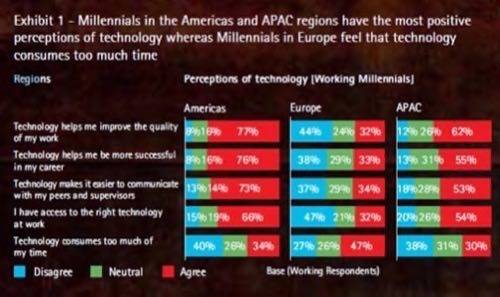We all know that young folks use the social Web for personal purposes, from keeping tabs on family members to sharing party pics with friends. And yes, as we reported more than a year ago, they even use the social Web – gasp! – while at their places of employment. But they’re also using more tech for work-related tasks, including interacting with customers and vendors and forming or strengthening new and existing partnerships.

According to a 5,595-person, 13-country survey from tech consultancy Accenture, since this generation has grown up with daily doses of technology in one form or another, “They don’t see bright lines between work
and personal, virtual and physical, sanctioned and prohibited. It’s not, ‘Would you approve this, boss?’ but, ‘Whatever gets the job done.'”
Millenials may not be completely aware of their company’s IT policies, including those on social media use. For example, only 40 percent of U.S. citizens ages 14-27 know what their company’s IT policy is. That percentage dips to 38 percent in the U.K., 36 percent in Australia and a laid-back 25 percent in France. And even if millenials are aware of these policies, many choose to ignore them and bypass restrictions.
IT managers often see these behaviors as weaknesses – loopholes that allow for security breaches and loss of productivity due to distractions and heavy multitasking. But they might also be allowing millenials to work smarter, not harder.

For example, more young people are using real-time communication methods such as IM, thus reducing the amount of time checking email and waiting for an asynchronous response. In fact, 10 percent of respondents said supervisors used SMS and chat to communicate with them, and 20 percent more said they wished their bosses would use these media more.
Web apps are also gaining favor in the young workplace. Around 75 percent of respondents said they used online collaboration tools and applications for work purposes; many of these millenials also thought that workplaces should be improving their use of emerging technologies. “Globally,” states the report, “about one-half of millennials have accessed online collaborative tools, online applications and open-source technologies from free public websites when those technologies are not available at work or when the versions offered at work don’t meet millennials’ expectations.”
Young people’s expectations are also high when it comes to selecting their next employer. Not only did 37 percent of respondents say they want to see state-of-the-art technology being used in their prospective workplace; just as recruiters and hiring managers often snoop around search and social sites to investigate a potential hire’s character, the millenial job-hunter will check up on prospective companies, peers and bosses, as well.
To hear some respondents explaining their attitudes and behaviors in their own words, check out this video from Accenture:
Although these attitudes and work styles can clash with older managers’ expectations, they can also provide great benefits to a workplace and team. “Millennials are more intimate with technology than any previous generation,” the report states. “Even high school interns can now add value. Companies that figure out how to tap younger workers’ tech savvy and listen to their ideas in a productive way will likely enjoy an increasingly strong innovation-based competitive advantage.
“Listen and learn. Millenials are a resource to be tapped, not a problem to be solved.:
What do you think of these results? Do they line up with your experiences using tech in the workplace and the attitudes and behaviors of your colleagues? Let us know in the comments.





















